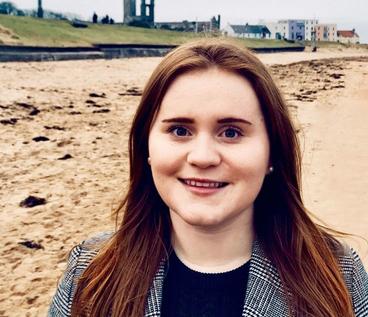By Maria Larson
and is now working for a children's rights organization
in the United Kingdom.
Lifelong advocacy comes to mind when reviewing the accomplishments of Humphrey School alumna Katie Burke. Burke, a native of Scotland, enrolled in the Master of Human Rights program in 2018 through the Fulbright program and graduated in May 2020.
Even before she began the program, Burke already had an impressive resume, which included chairing the Scottish Youth Parliament board and working with the United Nations Committee on the Rights of the Child (CRC) in Geneva. She was also chosen as one of the Young Women's Movement's ‘30 most Inspiring Scots Women under 30.’
During her time in the MHR program, Burke concentrated on gender and children's rights. After her first year, she interned for Together: The Scottish Alliance for Children's Rights, which allowed her to gain experience completing a substantial piece of children's rights research from start to finish.
As part of her internship, Burke co-authored the Scottish State of Children's Rights Report 2019 and worked with more than 50 NGOs to compile research on a variety of issues, from violence against children to educational inequality. Burke says her internship experience cemented her passion for children's rights and served as a springboard for her work after graduation.
After earning her degree in May 2020, Burke wanted a job that would allow her to put the interviewing skills and human rights knowledge she had learned through the program into practice, and she wanted to do so at the international level. She looked at organizations that meaningfully include the experiences of children and young people in their work, and was hired last summer as a research assistant at Coram International.
Coram International is a children's rights consultancy firm based in London, UK, that works with international organizations such as UNICEF and governments around the world on issues of child protection, gender-based violence, and juvenile justice.
Despite the realities of COVID-19 limiting her to remote work, Burke is currently involved with projects in numerous countries, including Kazakhstan, Papua New Guinea, the Philippines, Mongolia, and Nigeria. As part of a 10-person team, her work varies from day to day; she can be conducting Zoom interviews in Mongolia, working on drafts of a country's latest Child Protection law, or delivering training to government agencies.
Burke says her human rights studies equipped her with the qualitative interviewing skills and legal knowledge she needs to work as a children's rights researcher. Additionally, the community of students during her two years at the University taught her the value of knowing her positionality as a researcher, and the value of having meaningful conversations on a day-to-day basis about the ethical dilemmas of human rights work.
Burke says she loves her current work and doesn’t have plans to change anytime soon. Going forward, she is interested in further exploring children's rights, perhaps by pursuing a doctorate. She also is interested in getting more involved in activism, particularly as Scotland plans to be among the first countries in the world to incorporate the UN Convention on the Rights of the Child into its domestic law in the next year.
The original version of this story was published by the Human Rights Program in the College of Liberal Arts (CLA). The Master of Human Rights degree program is jointly offered by CLA and the Humphrey School of Public Affairs.


